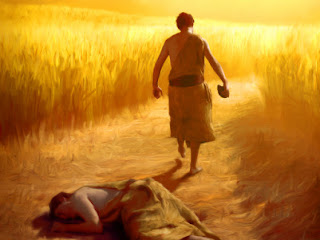----------------------
"Adam, where are you?" [Gen 3:9]God knows where Adam is, physically, but He wants Adam to understand and recognize where he has placed himself by his sin.
Where are you, Adam? Don't you see what's happened, Adam? What you and Eve have done to yourselves?
Yes, with that simple question God reminded them that He had given them paradise on earth, everything they needed, a gift they tossed aside. The two lost their intended place in God's creation, because they desired that which is reserved for God Himself. They listened to the serpent, and succumbed to the temptation to be God, forgetting that God had blessed them as no other creature had been blessed. They had been created in God's image, molded into His likeness. But they were still creatures, weren't they? They were not the Creator.
Oh, how that question, that Word of God, must have echoed throughout the Garden:
"Adam, where are you?"Adam is shamed. He and the woman are naked. With their sin they have cast themselves out of paradise and into exile. They know they have sinned, just as you and I know when we have sinned. But they refuse to admit it, to repent. Adam blames the woman. Yes, the other, the one created to be loved is now to be blamed. Already the effects of their sin have taken hold.
Sin and its effects will multiply and infect every generation that follows, pouring through the ages. In Genesis we soon encounter it again, don't we? When God asks another question:
"Cain, where is your brother?" [Gen 4:9]
 |
| Cain, where is your brother? |
Today God still asks those same two questions:
Where are you? Where is your brother?The world today, like our first parents, has become lost. Rather than recognizing and repenting of our sinfulness, rather than caring for one another, we cast blame, and we destroy.
"Where is your brother?"It's a question that God, in His love and mercy, asks each of us.
"Where are you?"Yes, God seeks us out, just as He sought Adam and Eve in the Garden. He calls us back to the reality of His love by exposing our sinfulness.
What horrors have you brought to my creation? Why do you turn away from me, convinced that you are gods?
God had provided them with food but they ate that which was forbidden them. Out of their rebellion something else is forbidden them: to eat of the Tree of Life, which would give them life eternal.
But even in their sinfulness, God offers them, and He offers us, a path to return to God from their exile. As they leave the Garden they have an encounter with God's mercy. From that encounter comes a promise. It is the promise of God's Son, the gift of Jesus Christ, who will take on Adam's nakedness, our nakedness, who will take on the shame of humanity, the shame of all our sins, and allow Himself to be sacrificed by those He created.
By His wounds we are healed.
Yes, Jesus is nailed to the Tree of Life, and leaves us a new food: the Eucharist, His own Body and Blood, God With Us in a way almost unimaginable. And now we can eat of the food that will give us eternal life. It is through Jesus Himself that we are transformed. The Mass is a kind of new Eden in which Jesus feeds us with the food that perfectly satisfies.
We see a foreshadowing of this in today's Gospel passage from Mark. This is the second miraculous feeding of the crowds. At the first Jesus feeds 5,000; in the second 4,000. Listen again to the Word of God:
 "...taking the seven loaves he gave thanks (in the Greek, eucharistesas), broke them, and gave them to
his disciples to distribute, and they distributed them to the crowd" [Mk 8:6].
"...taking the seven loaves he gave thanks (in the Greek, eucharistesas), broke them, and gave them to
his disciples to distribute, and they distributed them to the crowd" [Mk 8:6].Yes, the Eucharist, the Bread of Life, is given to us by Jesus but is distributed by his disciples. The same is true today. We, the disciples, are called to feed the hungry, to feed them with both the physical and spiritual bread they need.
Lord, teach us to be the servants we are called to be. Help us to serve you by serving others, regardless of the cost. Let us learn to accept the wounds of service as gifts, to turn our lives into a labor of love, happy and content only to do your will.


No comments:
Post a Comment